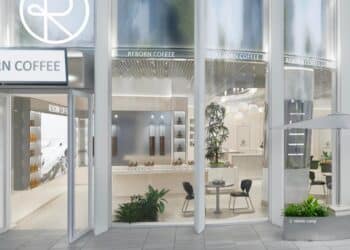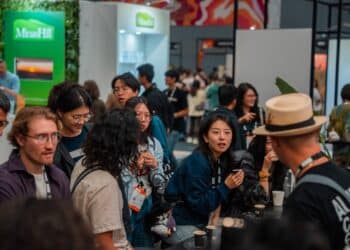Quality coffee is no longer limited to café settings. GCR explores how the hotel sector is switching on to the power of a premium cup.
Starting the day with a cup of coffee is a morning ritual for billions of people globally. Yet, until fairly recently, it seems few hotels paid much attention to the beans served to their guests, despite about 11 million people waking up in hotels each morning.
Most guests were happy to make an instant coffee at the beverage station in their rooms or use the capsule machine at the breakfast buffet. The few coffee aficionados who were particular about their morning cup became accustomed to searching for their fix elsewhere.
However, over the past decade, consumers have become far more discerning about the coffee they drink. The specialty movement has raised standards across the board and many coffee drinkers now expect to find a quality experience in all manner of settings, especially hospitality venues such as hotels and restaurants.
It’s a trend that’s been observed and acted on by many major players in the hotel sector, including Accor, one of the largest hospitality groups in the world with more than 5000 hotels and resorts in 110 countries. Adrian Williams, COO of Accor Pacific, says there’s been a noticeable shift in consumer expectations around food and beverage, including coffee.
“When I first started in the industry, coffee wasn’t really thought about and therefore not a lot of effort was put into it. There was a lot of bulk brew coffee and the quality was average, but that’s what people expected. However, consumer demand has seen the approach to coffee from hotels shift,” says Williams.
“Being from Australia, my interest in coffee has become a bit of an obsession, so for years when travelling I would bring my own setup – beans, a hand grinder, and an AeroPress – especially when overseas. I wanted to know I’d always be able to get a good coffee wherever I was. Like me, many consumers have become increasingly interested in the quality of the coffee they’re drinking. As a company, we no longer have the luxury of not thinking about our offering.”

The shift has been a gradual evolution over the past decade, according to Williams, with hotel groups like Accor taking note of consumers’ expectations.
“We have to think about coffee because our customers want us to. There’s a fear of going to a new city and not knowing where to get a good coffee, and if they’re unsatisfied that has a real impact on their whole experience of staying with us,” he says.
“For us as hotels, if we can provide a great cup of coffee the traveller can feel confident they can get their day started right and feel good. Being able to offer a reliable, quality experience now has a weighting on hotel preference.”
Accor has more than 20 brands in the Pacific, ranging from economy hotels such as ibis to premium and luxury venues such as Pullman and Sofitel. Of the group’s 440 venues in the region, the Food & Beverage department provides a range of coffee experiences, from in-bedroom beverage-making facilities to artisan coffee shops and fine-dining restaurants.
Over the past few years, Williams’ team have invested in providing an elevated coffee experience for all guests in all its venues.
“We’re increasingly putting more into training our teams, providing better quality equipment, and securing better quality coffee partnerships so we can provide an amazing coffee experience wherever our guests travel,” he says.
“We serve 30 million cups of coffee in the region each year – that’s a lot of opportunities to get it wrong if we don’t pay attention. Therefore, our teams are as focused on and as passionate about coffee as I am. We have 30 million opportunities each year to make an impact on a customer that will reflect their travel experience with us.”
Accor recently entered a new partnership with JDE Peet’s to supply its hotels across the Pacific with a range of coffee experiences. The global coffee company’s local brands include Campos, Hummingbird, Piazza D’Oro, and L’Or – each paired with Accor’s hotel brands to offer a tailored coffee experience.
“Regardless of the hotel they’re staying in, customers see coffee as an everyday luxury. It doesn’t matter if they’re staying at an ibis or a Pullman, they still deserve to have a great cup of coffee,” says Williams.
“We don’t have the same facilities across all our hotels, but we still have an obligation to provide barista coffee crafted by someone who’s well trained. In our premium hotels, we typically offer specialty-grade coffee in a café environment, whereas in a conferencing setting our focus is on large scale and quick service.”
Whereas previously it was rare to find an espresso-based option in some hospitality settings, pourover and batch brew offerings are now available alongside espresso in some hotel cafés and restaurants. At Swissôtel in Sydney, a specialty café is adjoined to the hotel as an independent venue that can be enjoyed by both guests and the public.
“You wouldn’t know the café is run by the hotel as it mainly serves the general public, but that experience is also available to our overnight guests. It’s inspired by the Sydney specialty coffee experience and serves an excellent batch brew from local roaster Single O – probably one of my favourites in the city,” says Williams.
“This ties into the shifting role of hotels in general – they are no longer just places to sleep. We are seeing people using the restaurants, cafés, and communal spaces in our hotels as less formal meeting places and we’re actively encouraging people to use them as a community space. Coffee is very much an important part of that interaction.”
While coffee has become an essential element of Accor’s food and beverage strategy, Williams admits the objective of this focus isn’t driven by revenue.
“It’s not so much that coffee is a revenue source but instead a means to creating an experience. Yes, we get great revenue from coffee, but we also want to create a more social environment and coffee is a vital part of that.”
Finding a new coffee roaster to work with was no easy feat for the Accor team. With a variety of venues in their stable, they needed a partner that could provide a range of styles and blends to service its different hotels. They also sought a company that shared its focus on sustainability.
“This is a big part of our global purpose: pioneering the art of responsible hospitality and connecting cultures with heartfelt care. When we talk about pioneering, that extends to creating amazing coffee experiences and pushing the boundaries, but doing so in a responsible way,” Williams says.
“When choosing a coffee partner, they had to share this vision. JDE Peet’s sustainability program and approach to sourcing demonstrates their commitment.”

A perfect match? Accor is far from the only large-scale hotel group placing greater emphasis on providing a quality coffee experience for its guests. Hilton, with its own range and scale of hotel brands, is doing the same.
The Australian owned and inspired United States (US) coffee roastery Bluestone Lane provides coffee for one of its newest brands, Tempo by Hilton, targeted at mid-tier health- and lifestyle-conscious guests. With Bluestone providing beans for Tempo’s four existing sites, and with eight more under construction and up to 60 more in the pipeline, there has been a clear intention from Hilton to offer quality coffee to its Tempo customers from the very inception of the brand’s existence.
Brand Leader of Tempo by Hilton Kevin Morgan says the ability to provide quality coffee to customers has been a key part of ascertaining where Tempo fits into the hotel landscape.
“Hilton has 24 brands and a focus on building brands organically. To do that we wrap the brands around what we call a design target,” says Morgan.
“In Tempo’s instance, our brand targets a guest muse named ‘Mark and Maya’. We know specific attributes around these individuals, and then we report back and figure out how to build it out.
“Each brand is built in a different traveller segments all with different needs. If you stay at a Hampton you want consistency from every location. As you go up the brand stack, those needs change, and you start to see more bespoke offerings. Tempo sits right in the middle of that stack.
“Where Hilton has put Tempo, it targets a traveller that, when they’re at home, is typically healthy, however, when on the road their routine is disrupted . We want customers to walk through the door to see brands that are reflective of what they are, and one of those is Bluestone Lane.”
Morgan says research conducted by Hilton has found an overwhelming desire for guests to start their day with some kind of coffee or caffeinated beverage, and it’s up to the hotels and brands themselves to distinguish which type of coffee should be supplied and which sites meet guest expectations.
“If you look at coffee as a whole, about 76 per cent of people start their morning routine with a coffee. How they want their coffee is different at a Hampton versus a Tempo versus a Waldorf, but we still found 92 per cent of people want some kind of coffee, tea, or hydration,” he says.
“Tempo was built around the lifestyle traveller who wants the things they have at home, things like a plant-forward menu, great coffee, and access to a well-equipped gym. That’s where the importance of coffee plays into this brand.”
Bluestone Lane currently operates more than 55 stores around the US. From downtown Los Angeles to New York and Washington D.C, the roastery and café chain holds a national presence across its retail and wholesale commercial operations. Since introducing the brand to market in 2013, Founder Nick Stone says he has aimed to provide stellar consistency through Bluestone’s products.
“The way we’ve engineered our coffee program is very, very portable,” says Stone.
“We’re very structured in how we make our coffee. You could be the best brewer in the world, but if you work at Bluestone you will make it our way – not because we’re obnoxious but because we’ve designed it to be so consistent.
“Bluestone is very much built around being a lifestyle brand. That alignment has led to a great understanding of the Tempo brand and the compatibility of the two companies.”
Morgan believes the desire to create high-level consistency in its product lends well to Bluestone’s model and supplying the hotel market.
“Hilton is a brand-led company, and when you look at what goes into protecting the brand, quality assurance and standards make sure there is a rigorous process that sits behind the processes and teams behind it,” he says.
“When we look at our partnership with Bluestone, it also means we must deploy resources to support Bluestone, whether that’s the right recipe card templates, or ensuring our team members are able to execute when they’re standing in front of the ingredients and the coffee machine.
“When you talk about scale, you want to make processes that are efficient and repetitive in nature. Bluestone’s process lends itself to allowing the coffee to be made the same way every time to ensure there is consistency in the cup.”

Where Hilton and Tempo are benefiting from Bluestone’s desire to create consistency in its product, the roastery has also seen gains from the hotel chain’s introduction into new markets. One of the major advantages of this existing collaboration, according to Stone, is the ability to assess its products in new environments with a captive audience.
“It’s a valuable way to drive trial and to understand the portability of your brand. If you are presented within a hotel in a new market and your product resonates well, it gives you a leading indicator on whether your retail proposition will be accepted by your target customers there,” he says.
“You’re introducing your product to hundreds, if not thousands, of people that may never have tried it. It’s extraordinary to think about the amount of effort and investment it would take to conduct a trial of that scale.”
Stone says Bluestone’s growing presence in Nashville, Tennessee, is the perfect example of how a coffee roaster introducing its product into a hotel environment can strongly benefit both parties.
“We had reasonable conviction that Nashville could be a great market for Bluestone Lane, but we received insightful data and validation about the consumer and where they were coming from through our partnership with Tempo,” he says.
“Are the locals captive in the hotel? What percentage of traffic is coming to the café externally? What are they ordering? Do they like coffee? Do they like matcha? How popular are iced lattes?
“Firstly, our partnership with Tempo acts as a huge catalyst to drive trial, grow brand awareness, and to reach existing customers in new markets. Second, you get to enjoy the commercial benefits of selling your wholesale beans and other proprietary products. Thirdly, it provides valuable market insights that can help scale your company’s licensed or retail strategy.”
This article was first published in the July/August 2025 edition of Global Coffee Report. Read more HERE.





